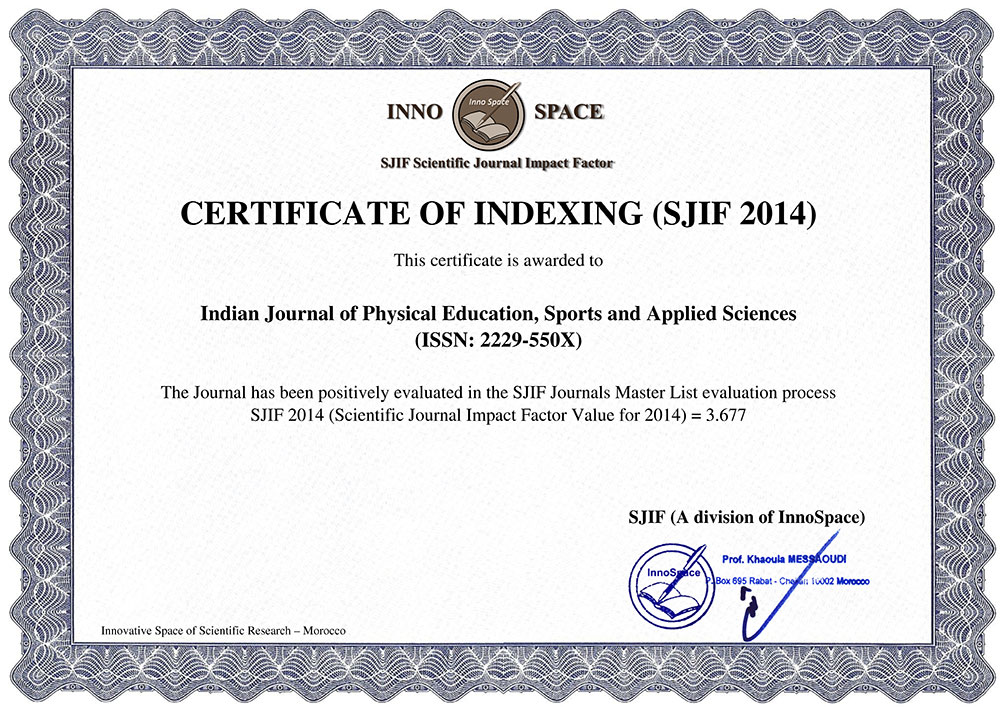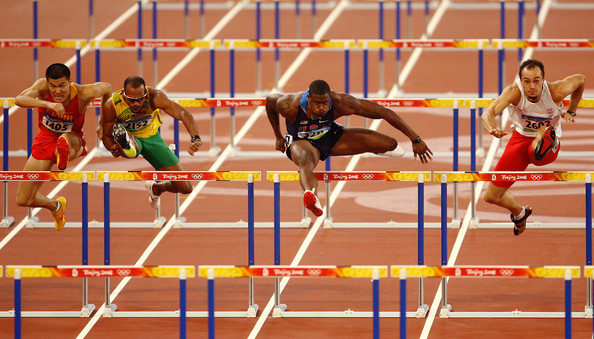PSYCHOLOGICAL FACTORS IN SPORT PERFORMANCE: IMPACT ON TRAINING, PERFORMANCE, RECOVERY AND HEALTH
Volume 7-Number 4, October, 2017 November 26, 2017| Author name : | Dr. Surander Singh | ||||
|---|---|---|---|---|---|
| Page no : | 72-78 | Volume : | 7 | Issue : | 4 |
doi no.: 05-2016-44975451, DOI Link :: http://doi-ds.org/doilink/11.2017-34448564/
Dr. Surander Singh
Affiliations:
1 B.P.E., M.A. M. Phil, Ph.D., (Physical Education) (MBA HR) Ph.D., R.T.M. University, Nagpur, Maharastra
ABSTRACT
Even though Psychology preparation is a component that has been often neglected by athletes and coaches alike, studies have shown that mental readiness was felt to be the most significant statistical link with Olympics ranking. Players need every now and again been cited will state how the mental perspective may be the A large portion imperative and only one’s execution. That mental wellbeing model about sport execution purports that an opposite association exists between psychopathology additionally game executions. The model postulates that as an athlete’s mental health either worsens or improves performance should fall or rise accordingly and there is now considerable support for this view. Investigations bring demonstrated that the middle of 70 Furthermore 85% of great What’s more unsuccessful Competitors could make identifier utilizing general mental measures from claiming identity structure Also temperament state, An level better than opportunity Anyhow insufflate for the reason for selecting players. Longitudinal the Mental Health Model (MHM) Examination demonstrates that those temperament state reactions of players show a dose-response relationship for their preparing load, a discovering that need indicated possibility for diminishing that frequency of the staleness syndrome done players who experience escalated consideration physical preparation. The MHM also has implications for the general care of athletes as support services have traditionally been limited to preventing or treating physical problems. Despite its simple premise and empirical support, the MHM has often been mischaracterized in the sport psychology literature and recently some authors have questioned its validity. This diagram will rundown MHM research, including those more later fill in directing, including the model’s progressive offers over an exert to purpose debate encompassing the mode.
Keywords: Players, Psychological Factors, Staleness Syndrome, Sport Performance, Impact on Training, Health.
DOWNLOAD FULL TEXT: 
BIBLIOGRAPHY
- Anderson M, Williams J. A model of stress and athletic injury: prediction and prevention. J Sport Exerc Physiol. 1988; 10:294-306.
- Basic Aspect of Sport Psychology : Edited by D.C. Lal, Sports Pub, 2006, iv, 328 p, ISBN : 8178792974
- Key Concepts in Sport Psychology : Cashmore, Cambridge Univ Press, Paperback, 304 p, 1, ISBN : 9780415253222,
- Brewer B. Review and critique of models of psychological adjustment to athletic injury. J Appl Sport Psychol. 1994; 6:87-100.
- Brewer B, Van Raalte J, Linder D. Role of the sport psychologist in treating injury athletes: survey of sports medicine providers. J Appl Sport
- 1991; 3: 183-190.
- Byerly P, Wennell T, Gahimer J, Domholdt E. Rehabilitation compliance in an athletic training environment. J Athl Train. 1994; 29:352-355.
- Connelly S. Injury and self-esteem: a test of Sonstroem and Morgan’s model. Brookings, SD: South Dakota State University; 1991. Thesis.
- Wiese D, Weiss M. Psychological rehabilitation and physical injury: implications for the treatment team. Sport Psychologist. 1987; 1:318-330.
- Duda J, Smart a, Trappe M. Predictors of adherence in the rehabilitation of athletic injuries: an application of personal investment theory. J SportExerc Psychol. 1989; 1 1:367-381.
- Gronito V, Hogan J, Varnum L. The performance enhancement group program: integrating sport psychology and rehab. J Athl Train. 1995; 30:328-331.
- Lynch G. Athletic injuries and the practicing sport psychologist: practical guidelines for assisting athletes. Sport Psychologist. 1988; 2:160-167.







